 |
|
Ivan Heald Hero and Humorist
by
Ivan Heald
With a Preface by Sidney Dark
|
|
 |
|
This is
the 1917 Third Impression
Ivan Heald
was born at Accrington in 1883, and became a journalist,
initially on the staff of the Ulster Gazette, then
subsequently the Manchester Sunday Chronicle and
finally to the London Daily Express. He enlisted in
the Royal Naval Division in 1914 and received a commission
in the Hood Battalion the following year. Heald served in
Gallipoli from June 1915 (when he was wounded, but returned
to duty) and then in France, where he spent several months
with his Battalion before transferring to the 25th Squadron
Royal Flying Corps as an Observer. Heald was aged 33 when he
was Killed in Action with his pilot on 4 December 1916 while
flying over the German lines. This volume contains a memoir,
some extracts from letters from Gallipoli and France, and
several articles he wrote for the Daily Express which
included light-hearted accounts of training with the Royal
Naval Division at HMS Crystal Palace during 1914-1915.
|
|
 |
 |
|
|
|
Publisher and place of
publication |
|
Dimensions in inches (to
the nearest quarter-inch) |
|
London: C. Arthur Pearson, Ltd |
|
4¾ inches wide x 7¼ inches tall
Please note the book's small dimensions. |
| |
|
|
|
Edition |
|
Length |
|
1917 Third Impression |
|
191 pages |
| |
|
|
|
Condition of covers |
|
Internal condition |
|
Original green cloth blocked in black. The
covers are rubbed (more heavily around the edges) and slightly marked but
still reasonably fresh although they have bowed out noticeably. The spine is a little dull and the spine ends and
corners are bumped and slightly frayed. There is a forward spine lean. |
|
There are no internal markings and the text is reasonably clean throughout; however, the paper has tanned noticeably with age and
there is a very small stain in the top margins of pages 10-13 (please see
the image below). There is some scattered foxing internally and the edge of
the text block is also foxed, heavily in places. Pages 126-127 (shown below)
have been carelessly opened and page 126 is slightly chipped on the outside
edge as a result. |
| |
|
|
|
Dust-jacket present? |
|
Other
comments |
|
No |
|
Generally a clean example of this rare volume,
noting foxing and tanning to the paper (not uncommon with War-time
Editions) and bowed covers. |
| |
|
|
|
Illustrations,
maps, etc |
|
Contents |
|
There is a portrait frontispiece (pencil
sketch), which is shown below. |
|
Please see below for details |
| |
|
|
|
Post & shipping
information |
|
Payment options |
|
The packed weight is approximately
400 grams.
Full shipping/postage information is
provided in a panel
at the end of this listing.
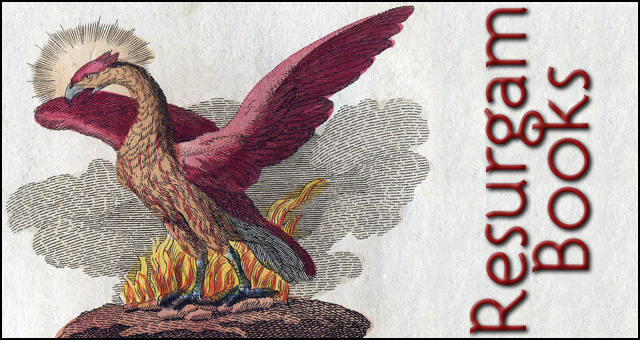 |
|
Payment options
:-
UK buyers: cheque (in
GBP), debit card, credit card (Visa, MasterCard but
not Amex), PayPal
-
International buyers: credit card
(Visa, MasterCard but not Amex), PayPal
Full payment information is provided in a
panel at the end of this listing. |
|
|
 |
|
  |
|
 |
 |
|
Ivan Heald : Hero and Humorist
Contents
Preface by Sidney Dark
Letter from Brigadier-General Freyberg, V.C.,
D.S.O.
Letter from Major Reginald Chadwick, M.C., R.F.C.
London Adventures and Reflections
Experiences Afield
The Basingstoke Adventure
Sports and Pastimes
Music and the Drama
Politics
The Happy Warrior
Letters en route for Gallipoli and from the East
Letters from France
|
|
 |
 |
|
Ivan Heald : Hero and Humorist
Preface by Sidney Dark
It is one of the little ironies with
which our lives are closely packed that Ivan Heald and I should
first have met on a golf course. Heald was a first-rate footballer
and a skilful swimmer, but he certainly never suggested the ancient
and gloomy game of golf. Our meeting place was not, however, an
ordinary golf course. It is situated in the wilds of Donegal, and it
was laid out to attract those strange beings unaffected by the
beauty of lough and mountain who will journey to the ends of the
earth to chase a small ball over broken ground.
We did not play golf, Heald and I, but we gossiped (as men do gossip
when they are attracted to each other) about most things in heaven
and earth. He was an irresistible sunny-hearted boy, and he found my
curiosity amusing. I am always curious about people whom I like. I
am impatient to find out what they really are, and Heald, like most
lovable men and women, wore his heart on his sleeve. The facts of
his short life were simple enough, yet because of the fairy strain
in him the simple facts became tremendously interesting.
I remember that he told me he was a Celt, that he had started work
as a journalist on the staff of the Ulster Gazette in the city of
Armagh, and that he was then assistant editor of the Manchester
Sunday Chronicle. He had never been to London, and of course it was
towards London that his eyes were set. I am proud to recall the fact
that I introduced Heald to the editor of the Daily Express, and that
my introduction gave him the medium for the expression of his
whimsical and beautiful personality.
Heald was not a success as a conventional newspaper reporter. His
eyes were entirely his own, and he simply could not see things as
other people see them. If he interviewed a millionaire, he wrote a
fairy tale. If he reported a political meeting, he came back with a
fantasy. Happily for him the editor realized his qualities, and he
was given a free hand. The result was a series of humorous
adventures unequalled in England during the last twenty years. Heald
had the Dickens faculty for discovering Titania hiding in back yards
and for finding amazing thrills on derelict canals.
His humour was himself. He never strained and sweated to make his
readers laugh. He just bubbled over. That was all. All humorists are
necessarily humanists, and Heald to the end of his all too short
life remained the same kindly lovable boy, the very personification
of the friendship that thinks no evil. His sister writes of him :
"He saw that life was not to be endured unless one laughed at its
every laughable phase, unless one loved every possibly lovable
thing/'
Soon after the outbreak of war, Heald enlisted in the Royal Naval
Division, and became Seaman Heald of H.M.S. Crystal Palace. It is
splendid to know how thoroughly he enjoyed himself in those early
days. He smoked a short clay pipe and adopted a nautical roll that a
veteran shellback might well have envied.
He was granted a commission in February, 1915, and he went out to
Gallipoli with the Naval Division in the following May. During the
tragic operations on the Peninsula he was wounded and sent to a
hospital in Cairo. Heald could see humour even in his own
misfortunes and he sent the Daily Express a delicious account of his
misadventure, for which, by the way, he was reprimanded by
humourless authority. After his recovery he went back to Gallipoli
and remained there until the final evacuation in January, 1916. In
one of Sir Ian Hamilton's dispatches he was mentioned for
conspicuous bravery and devotion to duty.
After some months with his battalion in France, Heald volunteered as
an observer in the Royal Flying Corps. Here, as was his habit, he
made many more friends and was praised by his commanding officer for
his keenness and capacity.
On December 4, 1916, he was shot down and killed with his pilot
while flying over the German lines. He was then only thirty-three !
The miracle of these years of war has been to discover the dauntless
courage and the splendid capacity for self-sacrifice possessed by
our friends whom, in the old peace days we never suspected of any
such qualities. Heald came fresh to London with an intense power of
enjoyment. For two years he revelled in the colour, the gaiety, and
the frivolity around him. But the good soldier was there all the
time. He left his life of bodily ease for the hammocks and the rough
and ready food of the Crystal Palace— and was absolutely happy. The
heat and flies of Gallipoli and its danger and desolation were
accepted as part of the day's work, and, in his letters home, he
wrote, not of the horrors of war, but of the poppies that were
growing beyond the trenches and the wonder of the Eastern skies !
The greatest tragedy of the war is that it has taken from us so many
of the men that the nation can least afford to spare, men at the
beginning of their lives with infinite potentiality for splendid and
enduring work. They are a noble company, these young men called away
in the early morning of their day, and Ivan Heald stands, in the
comradeship of death with Rupert Brooke, with Julian Grenfell, with
Dixon Scott, with Harold Chapin.
His sister suggests that the words Heald wrote of his brother
officer Charles Lister, quoted in Lord Ribblesdale's memoir of his
son, apply equally well to Ivan Heald himself:
" His willingness to sacrifice himself seemed part of some high
secret religion of his own, and those who mourn for him must realize
that this, coupled with his serene disdain of danger inevitably
meant his fall sooner or later in the campaign."
Ivan Heald has left to his friends and to the men of his profession
a splendid heritage of memory. He has made us realize more vividly
the possibilities that hide away in dull routine, and the beauty
that living and dying may both attain.
|
|
 |
 |
|
Ivan Heald : Hero and Humorist
Excerpts:
Letters en route for Gallipoli and
from the East
May 14, 1915.
It is good to be in such an efficient crowd as our Benbows. The
officers are very good and the men will do anything.
I will write you a long letter from Gibraltar. I would have written
oftener from here, but really there has been nothing to write about.
Life has just been a round of bugle calls.
Sunday, May 23, 1915.
I hope you are all well and cheery, for I am having such a great
time myself. We are now in the Mediterranean somewhere south of
Sardinia. The trip has been gorgeous. This sailing, sailing into the
south and the sunshine is sheer joy, and we officers have nice
cabins and good feeding.
We stole out from Plymouth in the night like pickpockets, and never
saw land until we reached Gibraltar. The rock is terrific—more
fantastic than gloomy or brooding as I imagined it. There are pale
red and yellow houses at the foot, all crushed and chaotic as though
they had fallen from the top, and you feel mightly impressed at
seeing Spain and Africa in one glance.
The sea's blue is so beautiful that you would rise from your meal
just to take one more look at it. It is a blue with a lot of white
in it. It might be mixed with milk or floored with white marble. I
think it is the colour of a penny blue balloon floating in the
sunlight—a far lighter, silkier blue than you would imagine.
I shall want to come this way again and again after the war. There
is a subtle feeling of home-coming about it. Anyway, I suppose this
is the cradle of the human race, and we Britons are only colonists.
I saw a shark to-day, and yesterday a lot of locusts were blown on
board. They were painted yellow like monkeys-up-sticks, and the
Lascars fried them alive and ate them surrounded by marvelling Tyne-siders.
Friday, May 28, 1915.
We are at the base at Lemnos. We had a day at Malta and the officers
got ashore. It is a gorgeous place with tremendously thick walled
houses, very Spanish, and the women wear peculiar black mantillas. I
would love to stay there for a time.
Most of our sailing has been in the open sea, but yesterday we
steamed all afternoon past the Greek coast and islands that were
like great mountain tops stretching themselves above the water.
It has all been very beautiful, and I think I would like to stay in
this part of the world. But I suppose the heat will be terrific when
we get ashore and go tramping the hills.
June 2, 1915.
We are now two miles behind the firing line, thousands of men living
in a great rabbit warren of dugouts. All day the French
seventy-fives go rushing like express trains over our heads towards
the Turks, and at night there is an endless bubbling of rifle shots
from the trenches. Sometimes a Turkish shrapnel shell comes our way,
but no one takes the trouble to get under cover.
It has all been very fascinating so far. Yesterday afternoon I lay
on my back watching the beautiful futile puffs of bursting shell
round our aeroplane scouts, and at sunset I bathed in the Hellespont
in sight of the green plains of Troy and the heavy bastions at the
entrance to the river Meander.
Our landing was awesome. We came in the moonlight on a Channel
Island passenger boat, across a pontoon bridge from the steamer
which was run ashore. The place reeked of slaughter. Before we won
the beach that April day the shingle was fringed with our dead,
hundreds of bodies rolling with the yard's ebb and flow of the tide.
But it was all safe when we came.
We have just been shelled. One man was hit thirty yards from me, and
a piece of shell has just dropped five yards away. They give you a
second's alarm and then you all laugh and look around to see if any
one's hurt.
The sun is very strong, but there are breezes, and I am wearing
nothing more than a shirt and short trousers. Besides my dug-out
there is a little fig-tree and I sit under its blessed shade and
look away to the north-west where the mountains of Samothrace are
piled up like a cloud. At sunset the land is old gold coloured.
I strolled round the lines last evening and it was like being behind
the scenes at a circus. There are Egyptian soldiers, Zouaves, Turcos,
Senegalese, French cavalry—all sorts and colours of costumes.
Soon we all go out to take a great sullen hill which is the
stronghold of the Turks.
There are red poppies out here, and wild roses.
June 11, 1915.
It has been fierce work, but now we are out of the trenches for a
rest, and reinforcements are coming in. Ever since we landed we have
lived under shellfire and bullets, but I am quite fit and cheery,
and I am pleased to find that I never have the slightest qualm of
fear. It is astonishing how one can look at things here without a
tremor. The other night I was directing the digging of a trench, and
one of my men called my attention to the fact that I was sitting on
a dead Turk. Yesterday I went on eating my breakfast while three men
were blown sky high just a few yards away. It was very weird that
night I was digging the trenches because we were so near we could
hear the Turks in front of us calling on Allah—long wails, for all
the world like crying babies.
June 17, 1915.
I hope you are all well and cheery. I am safe and well so far, but
the R.N.D. has suffered grievously. I am now in the Hood Battalion,
and at present I am commanding a company.
They are taking us away to an island for a rest in a day or two. For
three weeks I have lived under shell and shot night and day, and
many a time I have seen the man next to me killed or wounded. I
think I can stand it all better than any one here and I am never
despondent. I do hope you won't trouble about me whatever happens.
You will remember Love, the officer whose wife was at Waterloo when
you came to see me off. He was bathing with me in the Hellespont
when a big shell came over from Asia and killed him. I have written
to Mrs. Love. I got his body home and we buried him that night.
Young Asquith is one of our officers and he is on the way back from
hospital to join us. Freyberg's brother is also one of our officers.
My real trouble here is the flies. There is a plague of them. The
heat is not unbearable and there is always a breeze.
June 22, 1915.
We are resting on an island almost out of the sound of the guns, and
sweet it is to be able to walk about and have the shade of a tent.
There are mountains all around, and Greek women with baggy trousers
gathering in the corn. We bathe in the sea and sleep and eat, and
there is very little drill because it is too hot to work in the
middle of the day. Horsefield, the actor, who was in my section and
afterwards got a commission, has been killed in a charge. You may
remember meeting him that Sunday at Blandford.
We don't know how long we stay here,
but every one hopes it will be a long time. There are no flies here,
thank God, and we can buy cherries. We can also get plenty of
cigarettes.
The windmills go the wrong way round in Turkey. It looks quite
blasphemous and inspires me to fight Turks every time I see the
sails go round.
June 28, 1915.
We are back on the Peninsula again and will probably be up in the
front line to-morrow. Things are a little farther forward and we
don't get shelled half as much.
The island was a fine place. One day I rode on a pony over the
mountains to a village about seven miles away and sat in the local
pub with all the little Greek children around me.
Some more officers have come back, and the one for my company is
called Lister.
July 3, 1915.
We are still at the foot of Achi Baba, but we go forward a few yards
here and a few yards there. The hill is terribly strong and the
Turks are brave and clever.
I hope I am able to find Alan Ostler out here. I now mess with
Lister and young Asquith and they are very pleasant and cheery
people to be with. Lister has given me some mosquito netting to keep
out the flies. It would be a good thing if people sent fly netting
to soldiers out here. The flies settle on your face if you try to
sleep in the daytime, and every bit of food on the table is covered
with them. Thanks to my net, I can sleep in peace.
Part of a shell came in my sleeping valise the other day and tore up
my clothes and broke my tin whistle. I was out at the time.
July 22, 1915.
I am just after having a great sleep. We came out of the trenches
yesterday after a most strenuous six days. We went in to relieve the
first brigade which had made an advance, and when we arrived we
found the trenches strewn with dead Turks and bits of dead Turks. We
cleared the place up as much as we could, but even now there are
some of them only half buried It is not really half so ghastly as
you would think, or maybe it is that we have lost all of our sense
of these things. Anyway, I lived for four or five days in a few
yards of trench with the boots of a dead Highlander sticking out of
the trench side. The rotten, heavy, clinging smell was all over the
place, but when we came out it was hardly troubling me at all. There
are thousands of dead lying in between the fines of trenches and
there is no hope of getting them buried until we make a big advance.
The Hoods did fine work this time. The day before yesterday, when we
were all about done with digging and lack of sleep, my company made
a rush up to a Turkish redoubt and made a sandbag barricade in front
of it. Lister, who was wounded before we started, led the way. It
was wonderfully exciting and I was very happy and exalted while it
lasted.

Letters from France
October 21.
There is heavy rain to-day, or else we should have been dropping
bombs on the Huns. I was flying fairly high again yesterday, but we
did not go over the line because of the mist. The day before that
our little crowd brought five German planes down. Ours are splendid
fighting machines and we have the Boch left every time unless he
manages to sneak up on our tails. It is a great joy to me that I am
out of the trenches.
October 22.
I had a great flight yesterday, all along the trenches, but two
miles high. We did not grapple with any Huns, but I fired my little
gun at clouds just for practice. It was interesting to look down and
see little bits of trenches I had lived in.
This is a very famous squadron and they crush a German plane nearly
every day.
October 30.
Did I tell you that I flew over the German lines and dropped bombs
and that a piece of " Archie " shell hit me and made my back bleed ?
These will be dull days for you, I am afraid, but you must cherish
great hope of the spring and victory. And on wild nights when there
does be a great wind from the north you will know that one soldier
at least is sleeping smoothly on a goose-feather bed.
November 11.
I had two days' good flying on Thursday and Friday. On Thursday we
tried to drop bombs on a big fat balloon away behind the German
lines, and on Friday morning we tried to bomb a train. In the
afternoon we went over again and one of our pilots set fire to the
balloon with a bomb. Coming back, one of our machines broke in the
air and the pilot and observer were killed. The pilot was a slim
girlish boy of nineteen, and I was very fond of him. I got the end
of one finger frostbitten and I can't feel with it yet. We were over
14,000 feet high.
I think I shall get my leave somewhere about Christmas.
November 14.
Yesterday I went flying, and the engine went wrong and we had to
make a forced landing in a ploughed field. To-day we went up again,
and the engine went wrong and we had to make a forced landing in the
same field. It was rather jolly to meet the same peasants again.
Coming back in the mist, we were blundering past factory chimneys,
but they fired rockets at the aerodrome to guide us home.
November 23.
To-day I was in a big battle, a most exciting affair with about
twenty-four machines all swooping about and shooting each other. One
Hun came near enough for me to see the colour of his coat, and I
blazed bullets into him and he went away smoking. I had no time to
see if he fell or not because there were lots of others to be
shooting at. Two of our officers were wounded, but got down on this
side. It really was a wonderful half-hour, and I felt in great form.
|
|
 |
|
  |
 |
|

Please note: to avoid opening the book out, with the
risk of damaging the spine, some of the pages were slightly raised on the
inner edge when being scanned, which has resulted in some blurring to the
text and a
shadow on the inside edge of the final images. Colour reproduction is shown
as accurately as possible but please be aware that some colours
are difficult to scan and may result in a slight variation from
the colour shown below to the actual colour.
In line with eBay guidelines on picture sizes, some of the illustrations may
be shown enlarged for greater detail and clarity.
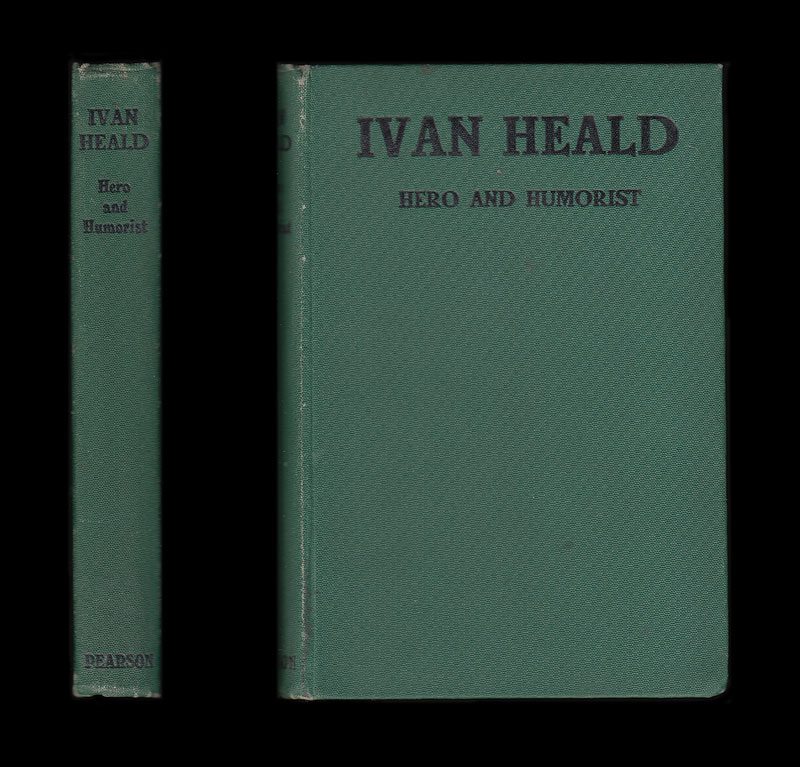
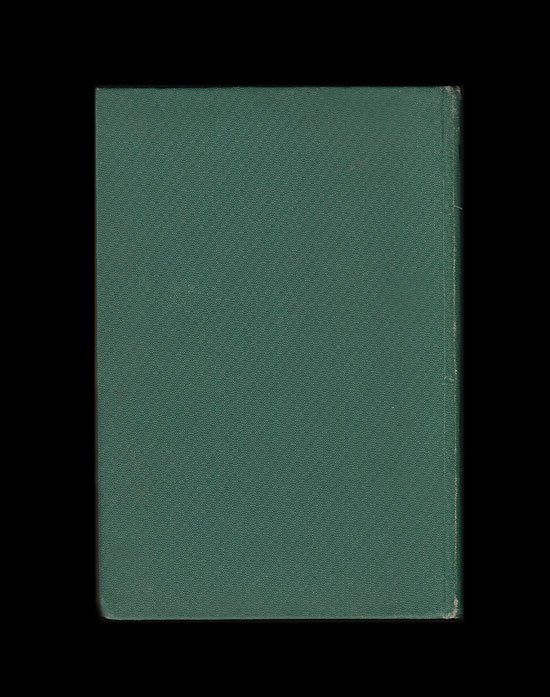

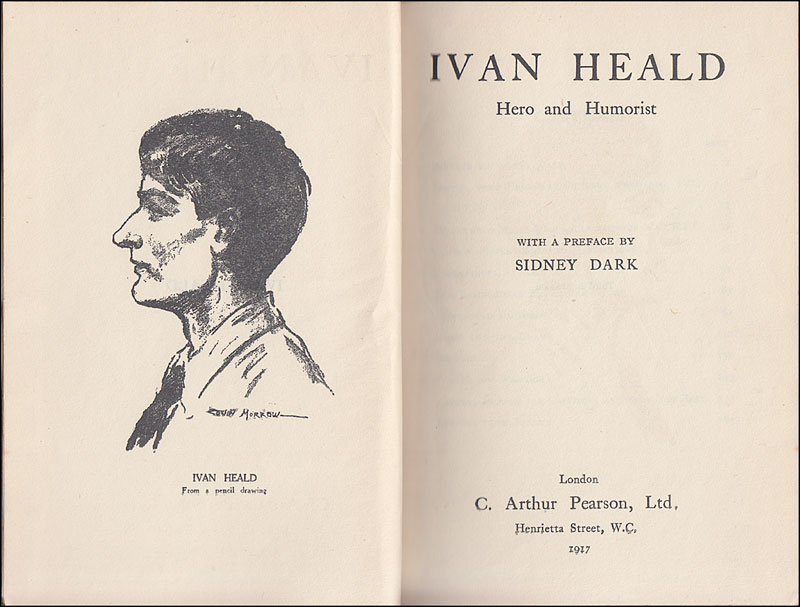
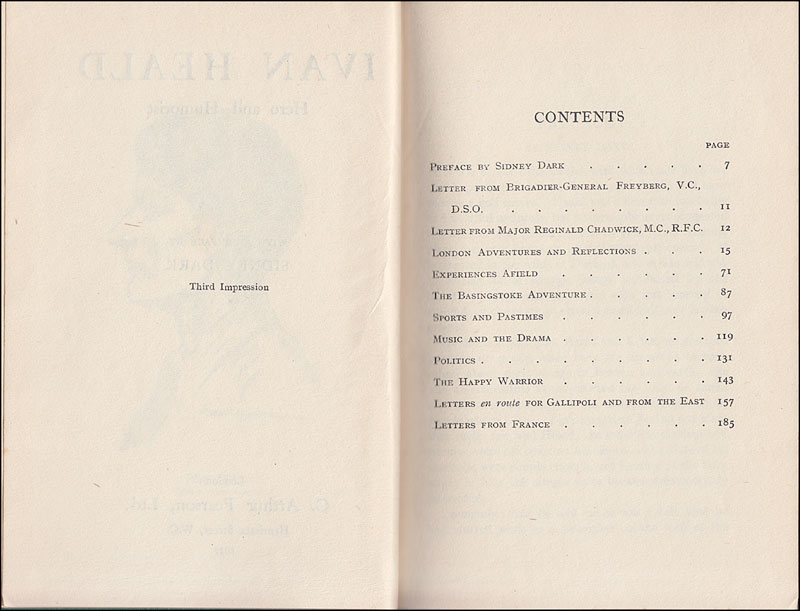
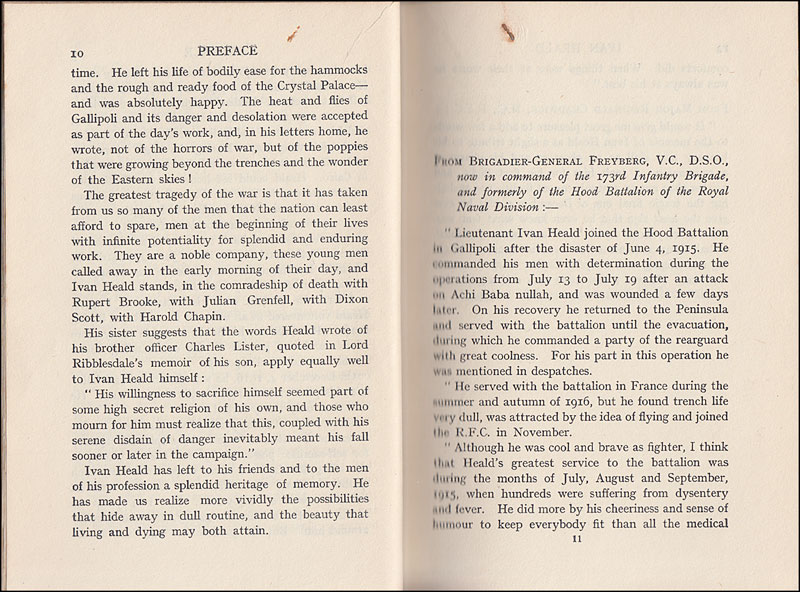
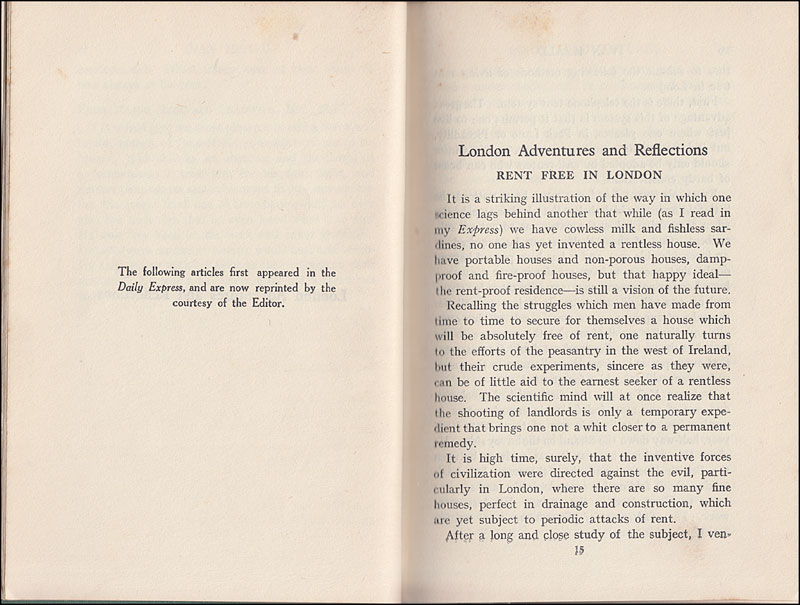
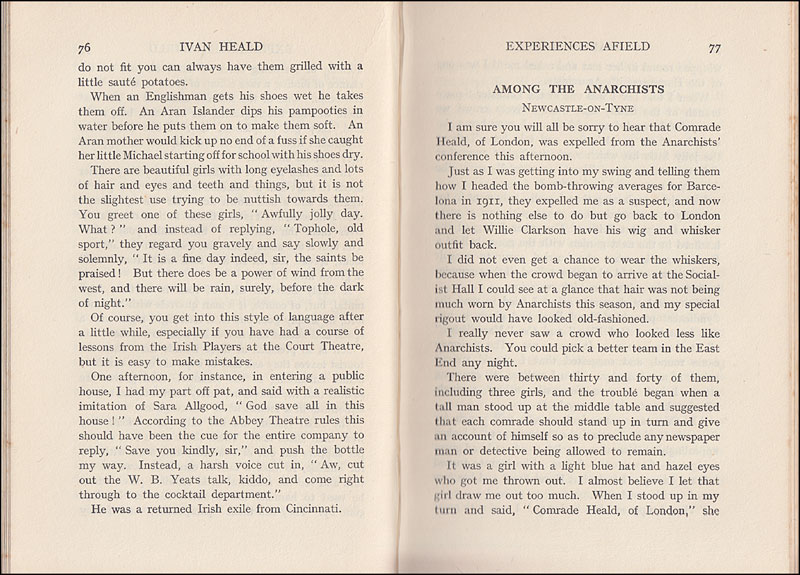
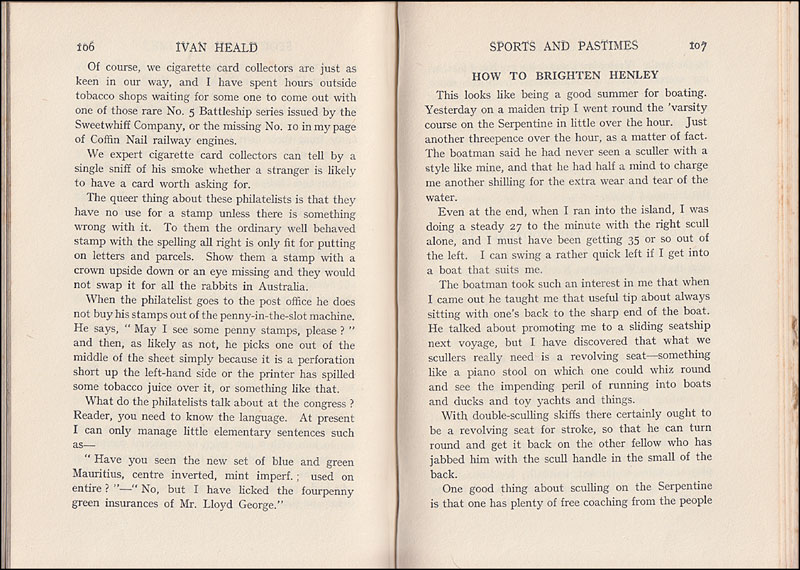
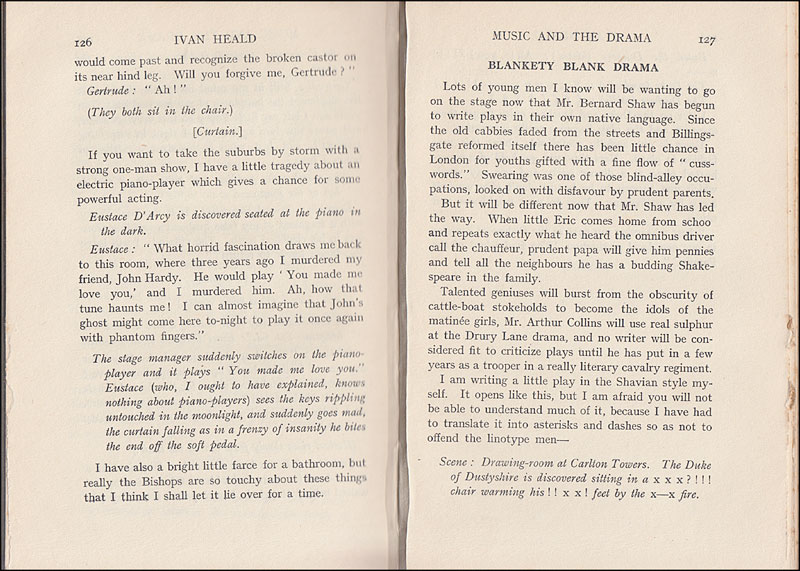
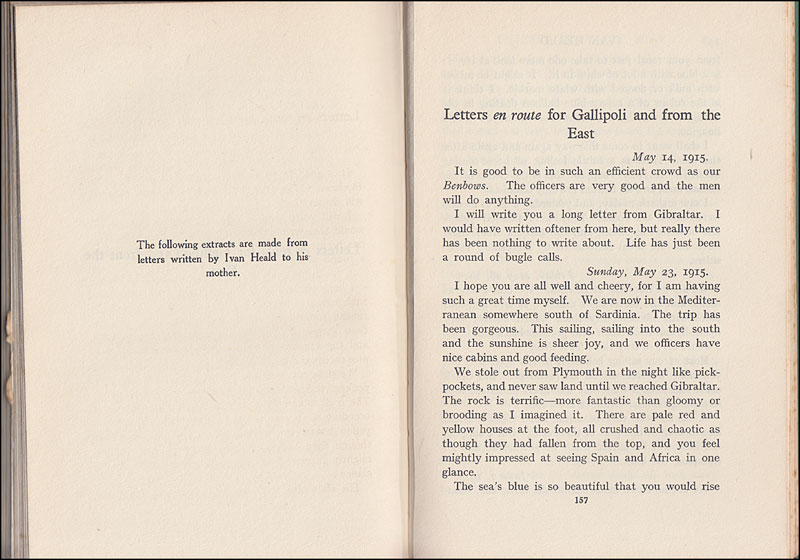
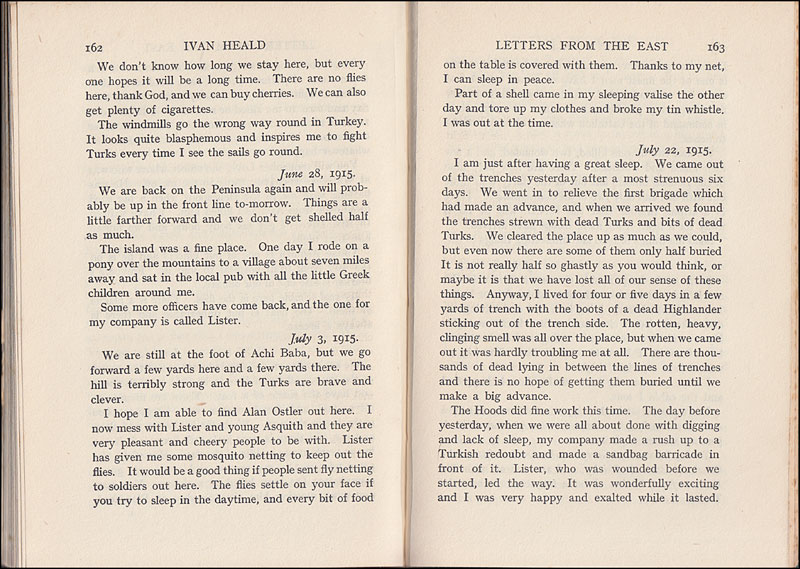
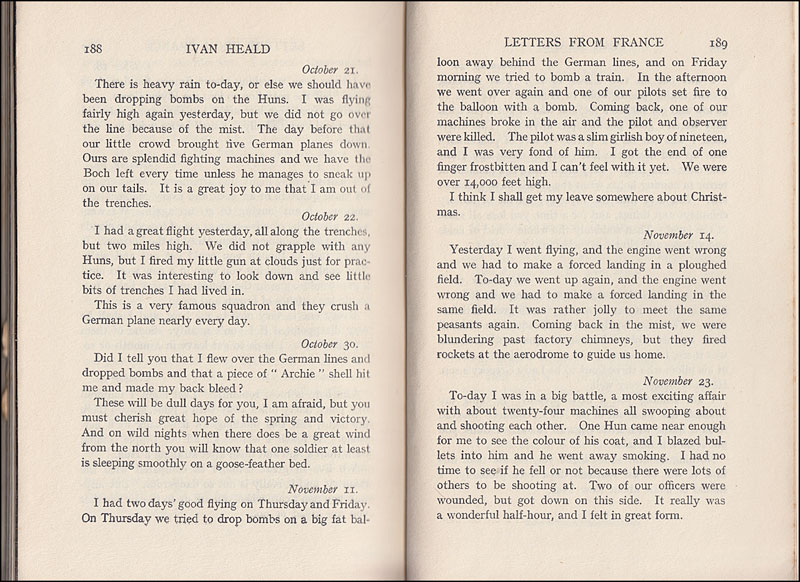 |
|
 |
|
 

IMPORTANT INFORMATION FOR PROSPECTIVE
BUYERS |
 |
|
U.K. buyers:
|
To estimate the
“packed
weight” each book is first weighed and then
an additional amount of 150 grams is added to allow for the packaging
material (all
books are securely wrapped and posted in a cardboard book-mailer).
The weight of the book and packaging is then rounded up to the
nearest hundred grams to arrive at the postage figure. I make no charge for packaging materials and
do not seek to profit
from postage and packaging. Postage can be combined for multiple purchases. |
Packed weight of this item : approximately 400 grams
|
Postage and payment options to U.K. addresses: |
-
Details of the various postage options (for
example, First Class, First Class Recorded, Second Class and/or
Parcel Post if the item is heavy) can be obtained by selecting
the “Postage and payments” option at the head of this
listing (above). -
Payment can be made by: debit card, credit
card (Visa or MasterCard, but not Amex), cheque (payable to
"G Miller", please), or PayPal. -
Please contact me with name,
address and payment details within seven days of the end of the auction;
otherwise I reserve the right to cancel the auction and re-list the item. -
Finally, this should be an enjoyable
experience for both the buyer and seller and I hope you will
find me very easy to deal with. If you have a question or query
about any aspect (postage, payment, delivery options and so on),
please do not hesitate to contact me, using the contact details
provided at the end of this listing.
|
|
 |
 |
|
International
buyers:
|
To estimate the
“packed
weight” each book is first weighed and then
an additional amount of 150 grams is added to allow for the packaging
material (all
books are securely wrapped and posted in a cardboard book-mailer).
The weight of the book and packaging is then rounded up to the
nearest hundred grams to arrive at the shipping figure.
I make no charge for packaging materials and do not
seek to profit
from shipping and handling.
Shipping can
usually be combined for multiple purchases
(to a
maximum
of 5 kilograms in any one parcel with the exception of Canada, where
the limit is 2 kilograms). |
Packed weight of this item : approximately 400 grams
| International Shipping options: |
Details of the postage options
to various countries (via Air Mail) can be obtained by selecting
the “Postage and payments” option at the head of this listing
(above) and then selecting your country of residence from the drop-down
list. For destinations not shown or other requirements, please contact me before buying.
Due to the
extreme length of time now taken for deliveries, surface mail is no longer
a viable option and I am unable to offer it even in the case of heavy items.
I am afraid that I cannot make any exceptions to this rule.
|
Payment options for international buyers: |
-
Payment can be made by: credit card (Visa
or MasterCard, but not Amex) or PayPal. I can also accept a cheque in GBP [British
Pounds Sterling] but only if drawn on a major British bank. -
Regretfully, due to extremely
high conversion charges, I CANNOT accept foreign currency : all payments
must be made in GBP [British Pounds Sterling]. This can be accomplished easily
using a credit card, which I am able to accept as I have a separate,
well-established business, or PayPal. -
Please contact me with your name and address and payment details within
seven days of the end of the auction; otherwise I reserve the right to
cancel the auction and re-list the item. -
Finally, this should be an enjoyable experience for
both the buyer and seller and I hope you will find me very easy to deal
with. If you have a question or query about any aspect (shipping,
payment, delivery options and so on), please do not hesitate to contact
me, using the contact details provided at the end of this listing.
Prospective international
buyers should ensure that they are able to provide credit card details or
pay by PayPal within 7 days from the end of the auction (or inform me that
they will be sending a cheque in GBP drawn on a major British bank). Thank you.
|
|
 |
 |
|

(please note that the
book shown is for illustrative purposes only and forms no part of this
auction)
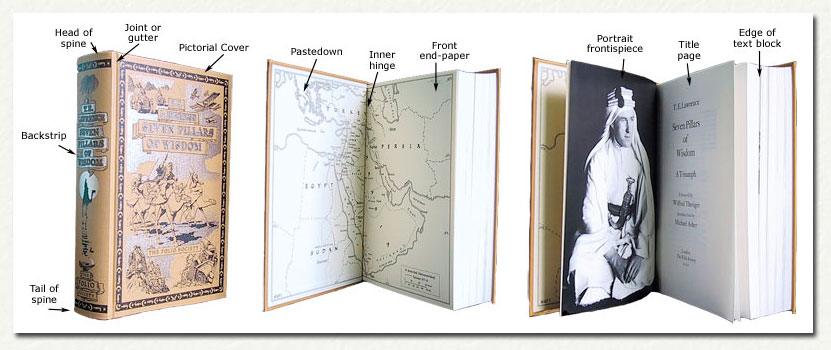
Book dimensions are given in
inches, to the nearest quarter-inch, in the format width x height.
Please
note that, to differentiate them from soft-covers and paperbacks, modern
hardbacks are still invariably described as being ‘cloth’ when they are, in
fact, predominantly bound in paper-covered boards pressed to resemble cloth. |
|
 |
 |
|

Fine Books for Fine Minds |
I value your custom (and my
feedback rating) but I am also a bibliophile : I want books to arrive in the
same condition in which they were dispatched. For this reason, all books are
securely wrapped in tissue and a protective covering and are
then posted in a cardboard container. If any book is
significantly not as
described, I will offer a full refund. Unless the
size of the book precludes this, hardback books with a dust-jacket are
usually provided with a clear film protective cover, while
hardback books without a dust-jacket are usually provided with a rigid clear cover.
The Royal Mail, in my experience, offers an excellent service, but things
can occasionally go wrong.
However, I believe it is my responsibility to guarantee delivery.
If any book is lost or damaged in transit, I will offer a full refund.
Thank you for looking.
|
|
 |
 |
|
Please also
view my other listings for
a range of interesting books
and feel free to contact me if you require any additional information


Design and content © Geoffrey Miller |
|
 |
|
|
|